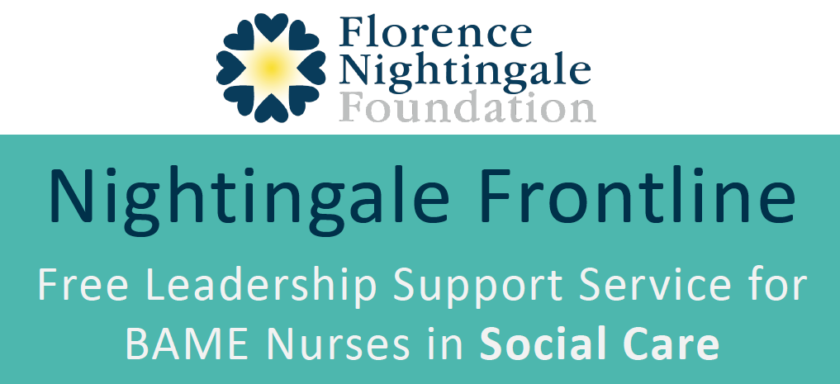
What is Nightingale Frontline: Leadership Support Service?
Thanks to generous support from the Garfield Weston Foundation, The Florence Nightingale Foundation (FNF) is delighted to offer the opportunity for Black, Asian and minority ethnic (BAME) nurses working in social care, to access to our hugely popular, fully funded Nightingale Frontline: Leadership Support Service.
The service was launched at the start of the pandemic in April 2020 to provide emotional and wellbeing support to nurses and midwives working on the frontline of COVID-19. Nurses and midwives work with trained specialists who help them develop the skills to support each other during this unprecedented time.
FNF is committed to helping nurses and midwives across healthcare. This includes nurses working across social care who look after patients with COVID-19. The pandemic has impacted every facet of health and care and the work of social care nurses has been overlooked.
Why do BAME social care nurses need to be recognised?
BAME nurses across health and care have been disproportionately affected by COVID-19:
- BAME health and social care professionals working on the front-line of patient care have been particularly vulnerable during the COVID-19 outbreak.
- 38% of nurses working in social care are from a BAME background.
- Failure to address the unique cultural experiences and preferences of BAME nurses will have a lasting impact on their ability to continue working during and after the current pandemic.
FNF is proud to support the BAME nursing workforce:
The Foundation runs leadership courses for all NHS and healthcare staff and has a long history of empowering BAME NHS staff, with 50% of participants across all Foundation leadership courses coming from a BAME background.
In 2018, FNF created the Windrush Leadership Programme, in collaboration with Health Education England, for descendants of the Windrush Generation and other BAME NHS staff. The purpose of the programme is to empower BAME staff and equip them with the skills, knowledge and confidence to pursue senior roles.
The impact of COVID-19 on BAME social care nurses
There are 41,000 nurses who work in social care enabling individuals with care and support needs, some of the most vulnerable people, many of whom have multiple co-morbidities and complex health issues, to live positively in their own homes or care homes, avoiding hospital admissions. Relative to the start of the Covid-19 outbreak in England and Wales, care homes have seen the biggest increase in deaths over time compared to deaths that have occurred in other settings. This will have clearly had an emotional effect not only for the families but also for the nurses caring for them.
Benefits of Nightingale Frontline:
We know that BAME nursing staff face exceptional and unique challenges whilst responding to Covid-19. Nightingale Frontline addresses these challenges by:
- Providing expert support delivered by a facilitator who is also a BAME leader and understands the specific challenges that BAME staff face.
- Delivering safe, confidential groups for BAME leaders to enable them to share and discuss the issues which are unique to them.
- Offering specific coaching to develop their leadership skills and capabilities.
Protecting the long-term health of BAME nurses
Our safe, confidential support service will act as a lifeline to vulnerable staff who are coping with the traumatic effects of working under extreme circumstances. Whilst much attention is on the immediate health effects of Covid-19, our support programme will reduce the longer-term mental health and social effects for nurses.
The demand for the service is growing and has to date reached over 1,700 participants. Many nurses and midwives who have accessed the service have expressed feelings of isolation and distress at having to cope with the large number of patients requiring end of life care. These feelings were often overlooked as demand grew and nurses and midwives had no outlet to express how they were feeling. FNF stepped in to provide this support and help them cope with additional demands of nursing during a pandemic.
To find out when our next free session is for BAME nurses in social care, please visit here.